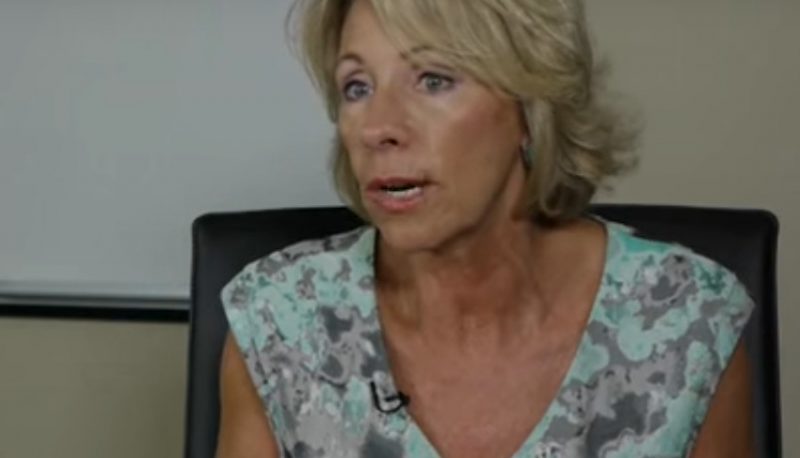This is National School Choice Week, an annual public relations spectacle designed to promote positive feelings about policies that undermine public education. It promotes a cheerful vibe by wrapping its participants in bright yellow scarves, which serve as a flashy distraction from the agenda at hand.
National School Choice Week sponsors embrace the broadest possible definition of “school choice,” including the diversion of tax dollars away from public schools and into unaccountable religious schools and profiteering corporations. There may be a little extra bounce in NSCW’s official dance routines this week given Donald Trump’s nomination of public education foe Betsy DeVos to be U.S. Secretary of Education, though her confirmation vote in the Senate Committee on Health, Education, Labor and Pensions, originally scheduled for Tuesday, has been delayed until January 31.
As People For the American Way noted in a report on her nomination, DeVos and her allies have poured millions of dollars into hard-ball politics at the state level to purchase the kind of voucher laws that public education opponents have dreamed about for decades. So it’s not surprising that her nomination had “school choice” proponents jumping for joy. National School Choice Week President Andrew Campanella used to work with DeVos at the American Federation for Children, one of the groups DeVos funded to push school choice.
But it may turn out that the nomination is a mixed blessing, because it has brought some urgently needed critical attention to the carefully constructed myths of school choice proponents.
DeVos and her allies are fond of making self-righteous claims to be on the side of students in a struggle against self-interested teachers and school administrators. But they’ve never had the data to back up those claims. There are many kinds of school choice, from public magnet schools to homeschooling. When it comes to charter schools, the record is quite mixed: some do a good job educating kids, others don’t. The record is worse for the kind of voucher program that Trump has proposed and that DeVos has pushed as what one researcher called “the four-star general of the voucher movement.” This disconnect led Tulane University’s Douglas Harris to call the DeVos nomination “a triumph of ideology over evidence that should worry anyone who wants to improve results for children.”
This is even—or especially—true in DeVos’ home state of Michigan, where she and her family have had their greatest political influence. Thanks in part to her political machinations, Michigan is a center of “school choice,” but is also, as The New York Times found, “among the worst places to argue that choice has made schools better.” Indeed, “As the state embraced and then expanded charters over the past two decades, its rank has fallen on national reading and math tests.” Eighty percent of the state’s charter schools are run by for-profit organizations and most perform below the state average.
The Sargent Shriver National Center on Poverty Law says DeVos has “used her massive personal wealth to push policies that divert public tax money into schools run by for-profit companies in Michigan.” And while those schools have “mushroomed with an influx of public money,” they have had “virtually no accountability for their poor performance in educating children.”
A recent report from the Economic Policy Institute found that the expansion of charter school programs is putting increased stress on public schools while opening the door to greater corruption. In addition, it is worsening inequities and increasing segregation by race, economic status, language and disability status.
Slate’s Sarah Carr wrote recently that even many proponents of educational options have come to realize that “an ideological free-market approach to school choice where taxpayer dollars follow students directly to public schools, charter schools, virtual schools, private schools, home-based schools, and a host of other options”—in other words, the “give-us-the-money-with-no-strings-attached” approach of National School Choice Week—“could inflict significant damage on the poorest communities.”
DeVos has made a name for herself in the education policy arena, and has gotten legislators to enact her favored policies, thanks to what Inside Philanthropy called her family’s “remarkable talent for moving money by the truckload into socially conservative causes to shift voters’ and lawmakers’ mindsets in a rightward direction.” The DeVos family has poured millions into funding the Republican Party, the infrastructure of the Religious Right, and attacks on unions.
During her confirmation hearing, Democrats raised questions about DeVos’ qualifications, ideology, and conflicts of interest, even though the committee chair, Republican Sen. Lamar Alexander, allowed them only five minutes each for questioning. Democrats asked for another hearing before a confirmation vote is held, but Alexander has refused.
At her hearing, DeVos said she did not intend to undermine public education, though Sen. Tim Kaine called attention to the 2015 speech in which she declared, “Government really sucks.” She repeated talking points like “I support accountability” without answering Kaine’s question about whether all schools getting public money should face the same kind of accountability. That’s a crucial question, given recent reports suggesting that “much of the vaunted ‘accountability’ of charter schools is an empty promise at best, and at worse, a curtain to hide all sorts of malfeasance and corruption.”
DeVos declared that she would not mandate that states adopt a particular school choice plan, but she would not commit herself to not working to privatize public schools or cut their funding. Asked about the rights of students with disabilities, she said it was a state issue, seemingly unaware of an important federal law protecting those rights.
The Los Angeles Times was unsparing in its assessment of her performance:
Betsy DeVos’ love of private school vouchers didn’t disqualify her for the role of U.S. Education secretary, even though vouchers are a bad idea. Nor did her lack of experience in public schools.
What did render her unacceptable was her abysmal performance at her confirmation hearing Tuesday, during which she displayed an astonishing ignorance about basic education issues, an extraordinary lack of thoughtfulness about ongoing debates in the field and an unwillingness to respond to important questions.
Ouch! But hey, look over here, bright yellow scarves!
This post has been cross-posted at Huffington Post.








